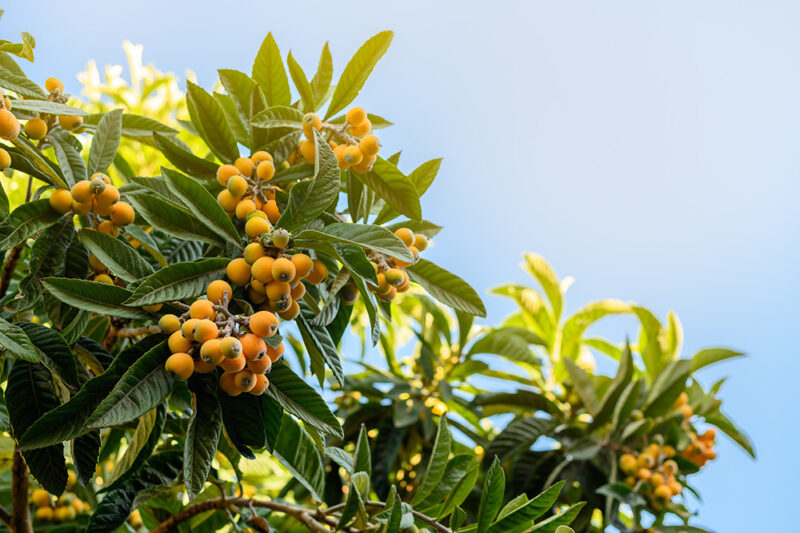
Fruit tree with loquats. A loquat tree blooming with ripe orange fruits and large green leaves.
The shift from summer to fall is perhaps the most difficult adjustment for most folks healthwise; colds, flu and viruses start to arise now. Loquat leaf is a fabulous fall herb since it’s great for all sorts of coughs that are common at this time of year. It is especially effective when there is abundant phlegm.
Loquat leaf for phlegm in the Lungs
I once had a patient who had a small farm she rarely left. She called me one day saying she had a difficult time breathing when lying down as her lungs would fill with fluid. I told her about loquat leaf since she had a tree on her land. She proceeded to make a tea from its leaves and in short time, her lungs cleared so she could easily breathe again in any position. She claimed it was a miracle herb for her.
Decades ago my neighbor’s asthmatic lungs filled with phlegm. I also told her to make tea from the loquat tree growing in her yard and she, too, had great results.
If you don’t have access to a loquat tree, even though they grow throughout the world in subtropical and mild temperate climates, you can purchase prepared loquat syrup as it is readily available in stores as the general go-to herb of choice for coughs. This is because it treats coughs from any root cause. That means it’s good for coughs from not only cold phlegm but also excess and deficient heat, even if there’s little or no phlegm production.
Loquat leaf for directing energy downward
One of the ways it works is by “directing the qi downward” in the lungs and stomach. In other words, it assists energy to move down instead of up. In the lungs, upward energy causes coughs while in the stomach it can make food go up instead of down.
This downward moving energy also makes loquat great for other conditions with the stomach “upward moving energies” such as nausea, vomiting, hiccough, and belching, thus aiding digestion, too. And because it clears heat in the stomach, it can relieve thirst, too.
If this is not enough, it stops bleeding as well, treating hemoptysis and nosebleeds.
Loquat leaf for impetigo
An acupuncturist friend, Sally Sherriff, recently told me of her experiences learning about loquat when living in Japan for over six years. At the time her son was young and in his first year of preschool. The kids kept getting impetigo. She asked a local herbalist for recommendations and was told to pick and make a tea from the darkest, oldest loquat leaves. Her son drank the tea plus she rinsed his skin with it. From this, all the spots on his skin cleared up. She also learned to give him the tea every year at the beginning of the hot, humid rainy season, and they’d even drink it the whole rainy season. As a result, her son never got impetigo again.
Pick the darker leaves as they are more strongly medicinal, and rub the hairs off their backs first. (It’s possible to drink the tea without first rubbing the hairs off the leaves, but they can irritate the throat.) Simmer for 20 minutes and drink a cup of this beautiful orangey-pink tea one to three times a day.
Loquat fruit is also eaten, but the seeds are slightly poisonous and so should not be used.
Loquat in Ayurveda
In terms of Ayurvedic medicine, I don’t know how widely it is used but apparently many different species grow in India and the fruit is especially prized because it is high in nutrients. Most peel the skin and eat the inside soft, fleshy pulp. Avoid the green fruits.
According to Shri Dhanwantry Ayurvedic College and Hospital, the fruit is sedative and eaten to halt vomiting and thirst; the flowers and leaves also have expectorant properties, plus the dried, powdered leaves may be taken to relieve diarrhea and depression, counteract intoxication from consumption of alcoholic beverages, and are applied externally on swellings.
Loquat can grow as a large evergreen shrub or tree. Its hydrocyanic acid content is not concentrated in the leaf, so this herb does not require the same caution as other hydrocyanic acid-containing herbs (such as wild cherry bark and apricot seed).
Loquat Leaf (Eriobotrya japonica)
Also named: Pi pa ye (Chinese), Eriobtrya, Eriobotryae Folium
Family: Rosaceae
Energy and flavors: Neutral, bitter
Organs and channels affected: Lung, Stomach
Chemical constituents: Saponins, amygdalin, triterpenes, volatile oil, hydrocyanic acid Properties and actions: Antitussive, expectorant; transforms Phlegm and stops coughing and wheezing, directs Qi downward, stops bleeding
Caution: In Cold conditions
Dosage and preparation: Decoction, 6-15g (simmer leaves covered 20 minutes). Syrup, 1-2 Tblsp. TID or as needed. Rub hairs off the backs of the leaves before using.
